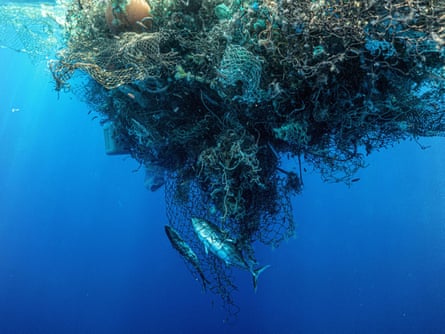Support is growing internationally for a new global treaty to tackle the plastic pollution crisis, it has emerged, though so far without the two biggest per capita waste producers – the US and the UK – which have yet to signal their participation.
A UN working group on marine litter and microplastics met at a virtual conference last week to discuss the issue. More than two-thirds of UN member states, including African, Baltic, Caribbean, Nordic and Pacific states, as well as the EU, have declared they are open to considering the option of a new agreement.
The treaty would be akin to the Paris climate agreement or the Montreal protocol to prevent ozone depletion. Neither the UK nor the US have declared their desire for a new agreement.
Britain, which leaves the EU at the end of the year, is considering one of two options: to support increasing calls for negotiating a new global treaty, or to strengthen existing agreements to reduce plastic waste. A decision by Zac Goldsmith, a minister for the environment, is understood to be imminent. The US has so far opposed an international agreement on plastic waste.
The UN environment assembly, which set up the ad hoc working group (AHEG) on marine plastics in 2017, concluded that the existing international legal framework governing plastic pollution, including the Stockholm and the Basel conventions, is fragmented and ineffective.
The flow of plastic into the ocean is expected to triple by 2040 if current trends continue, up to 29m tonnes a year – the equivalent of 50kg for every metre of coastline in the world. All efforts made and announced so far to curb plastic waste are expected to reduce the volume by only 7%. Once in the sea, it breaks down into microplastics, to be ingested by marine life.
Political momentum for a global agreement to address the full lifecycle of plastic has been growing, with several high-level ministerial declarations in favour.

A huge ball of old nets and plastic waste in the North Pacific subtropical convergence zone – more commonly known as the Great Pacific garbage patch. Photograph: Ocean Voyages Institute/ZUMA Wire/REX/ShutterstockAdvertisement
Earlier this month, a resolution calling for the world community to agree to a binding global agreement was adopted by International Union for the Conservation of Nature members, and 2 million people have signed a petition calling for one to be adopted.
At last week’s fourth and final meeting of the AHEG group, which will feed into UNEA’s 5th conference in 2021 and 2022, many delegates expressed concern that the crisis was being exacerbated by excess plastic pollution linked to personal protective equipment necessary to fight the coronavirus





